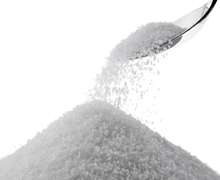
It may come as no surprise, but researchers from the University of Minnesota confirmed sugar consumption is directly linked to increased fat deposits. But the worst part about that news is the fat they found did not just accumulate in the abdomen. It was found around heart and other organs which can lead to a cascade of adverse health consequences.
The study findings published in the European Journal of Preventative Cardiology focused on the worldwide problem of too much sugar intake. The United States is one of the top six countries in the world in terms of per capita sales of sugary drinks. The others are Chile, Mexico, Argentina, Peru and Saudi Arabia. And demand is increasing in Asia, Africa and Russia.
"When we consume too much sugar the excess is converted to fat and stored," said University of Minnesota School of Public Health researcher So Yun Yi. "This fat tissue located around the heart and in the abdomen releases chemicals into the body which can be harmful to health. Our results support limiting added sugar intake."
The data the scientists evaluated in the observational study came from the Coronary Artery Risk Development in Young Adults (CARDIA) cohort which included more than 3,000 people between the ages of 18 and 30. The CARDIA team gathered information from centers in Alabama, California, Illinois and Minnesota.
Researchers measured the association between long-term sugar consumption and fat deposits around the heart and other internal organs. They took into consideration the consumption of sugar-sweetened beverages such as soft drinks, fruit drinks and energy drinks. They also looked at sugar consumption in the form of added sugars in other beverages and processed foods.
These values were measured several times between 1985 and 2005 and then in 2010 the study participants had computed tomography (CT) scans of the chest and stomach to measure fat deposits. The higher the volume of sugar the more fat was stored around the organs and in the abdomen later in life.
"Our findings provide more evidence that consuming too much added sugar and sugary drinks is related to a higher amount of fat tissue," said Minnesota’s Dr. Lyn Steffen. "And, we know that fat deposits are connected with higher risks of heart disease and diabetes."
Dr. Steffen believes there is plenty of blame to go around when it comes to the health crisis of excess sugar intake. "On top of our individual efforts, governments, food manufacturers, restaurants, schools, and workplaces have a role to play in increasing consumer awareness of the sugar content in foods and beverages and offering healthier alternatives," she said.
She offered advice for helping people lower their sugar intake. "Have water instead of sugary drinks and choose healthier snacks over foods rich in added sugar like cakes," she suggested. "Read food labels to check the amount of added sugar in what you are buying. Look for ingredients like syrups, glucose, fructose, sucrose, and maltose. Being more aware of hidden sugar will help you cut back."
Click here to read more in the European Journal of Preventative Cardiology.
